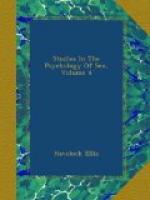[95] Scripture, Thinking, Feeling, Doing, p. 85.
[96] Tarchanoff, “Influence de la Musique sur l’Homme et sur les Animaux,” Atti dell’ XI Congresso Medico Internationale, Rome, 1894, vol. ii, p. 153; also in Archives Italiennes de Biologie, 1894.
[97] “Love and Pain,” Studies in the Psychology of Sex, vol. iii.
[98] Fere, Travail et Plaisir, Chapter XII, “Action Physiologique des Sens Musicaux.” “A practical treatise on harmony,” Goblot remarks (Revue Philosophique, July, 1901, p. 61), “ought to tell us in what way such an interval, or such a succession of intervals, affects us. A theoretical treatise on harmony ought to tell us the explanation of these impressions. In a word, musical harmony is a psychological science.” He adds that this science is very far from being constituted yet; we have hardly even obtained a glimpse of it.
[99] American Journal of Psychology, April, 1898.
[100] American Journal of Psychology, November, 1887. The influence of rhythm on the involuntary muscular system is indicated by the occasional effect of music in producing a tendency to contraction of the bladder.
[101] Archiv fuer Anatomie und Physiologie (Physiologisches Abtheilung), 1880, p. 420.
[102] M.L. Patrizi, “Primi esperimenti intorno all’ influenza della musica sulla circolozione del sangue nel cervello umano,” International Congress fuer Psychologie, Munich, 1897, p. 176.
[103] Philosophische Studien, vol. xi.
[104] Binet and Courtier, “La Vie Emotionelle,” Annee Psychologique, Third Year, 1897, pp. 104-125.
[105] Guibaud, Contribution a l’etude experimentale de l’influence de la musique sur la circulation et la respiration. These de Bordeaux, 1898, summarized in Annee Psychologique, Fifth Year, 1899, pp. 645-649.
[106] International Congress of Physiology, Berne, 1895.
[107] The influence of association plays no necessary part in these pleasurable influences, for Fere’s experiments show that an unmusical subject responds physiologically, with much precision, to musical intervals he is unable to recognize. R. MacDougall also finds that the effective quality of rhythmical sequences does not appear to be dependent on secondary associations (Psychological Review, January, 1903).
[108] R.T. Lewis, in Nature Notes, August, 1891.
[109] Cornish, “Orpheus at the Zoo,” in Life at the Zoo, pp. 115-138.
[110] Descent of Man, Chapters XIII and XIX.
[111] “The Origin of Music” (1857), Essays, vol. ii.
[112] Anyone who is in doubt on this point, as regards bird song, may consult the little book in which the evidence has been well summarized by Haecker, Der Gesang der Voegel, or the discussion in Groos’s Spiele der Thiere, pp. 274 et seq.




